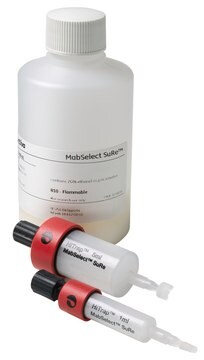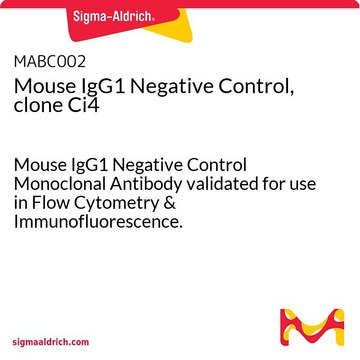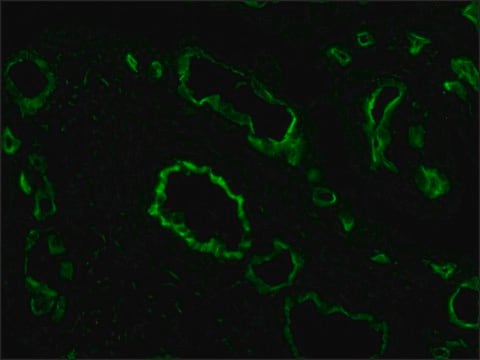MABC006
Mouse IgG2b Negative Control, clone GC198
Mouse IgG2b Negative Control Monoclonal Antibody validated for use in Flow Cytometry & Immunofluorescence.
Autenticatiper visualizzare i prezzi riservati alla tua organizzazione & contrattuali
About This Item
Codice UNSPSC:
12352203
eCl@ss:
32160702
NACRES:
NA.42
Prodotti consigliati
Origine biologica
mouse
Livello qualitativo
Forma dell’anticorpo
purified immunoglobulin
Clone
GC198, monoclonal
Produttore/marchio commerciale
Chemicon®
Concentrazione
0.5 mg/mL
tecniche
flow cytometry: suitable
immunofluorescence: suitable
Isotipo
IgG2b
Condizioni di spedizione
wet ice
modifica post-traduzionali bersaglio
unmodified
Specificità
This antibody reacts with the outer membrane protein of some strains of Neisseria gonorrhoeae. No reaction with human cell surface or plasma components has been observed. However, some binding to Fc receptors may occur.
Immunogeno
Protein I preparation from Neisseria gonorrhoeae.
Applicazioni
Mouse IgG2b is a monoclonal antibody intended for use as a negative control in immunofluorescence, flow cytometry, and immunoperoxidase staining on frozen and paraffin tissue sections. Its use enables an estimation of non specific binding of mouse monoclonal antibodies to cell surface components in peripheral blood and tissue.
SUGGESTED USAGE
The control antibody should be diluted to the same concentration as the test antibody, and equivalent volumes used.
SUGGESTED USAGE
The control antibody should be diluted to the same concentration as the test antibody, and equivalent volumes used.
Research Category
Secondary & Control Antibodies
Epitope Tags & General Use
Secondary & Control Antibodies
Epitope Tags & General Use
Research Sub Category
Isotype Control Antibodies
Isotype Control Antibodies
Linkage
Replaces: CBL602
Stato fisico
Format: Purified
Purified immunoglobulin. The antibody is supplied in 0.5ml 25mM Tris-HCl, 0.4M NaCl, pH 8.0, containing 0.2% bovine serum albumin and 0.1% sodium azide. The characteristics of each lot are tested by electrophoresis, specific immunofluorescence assay and flow cytometry.
Stoccaggio e stabilità
Store at 2 to 8°C, for up to 6 months. For prolonged periods, store below -20°C in undiluted aliquots. AVOID REPEATED FREEZE/THAW CYCLES.
WARNING: The monoclonal reagent solution contains 0.1% sodium azide as a preservative. Due to potential hazards arising from the build up of this material in pipes, spent reagent should be disposed of with liberal volumes of water.
WARNING: The monoclonal reagent solution contains 0.1% sodium azide as a preservative. Due to potential hazards arising from the build up of this material in pipes, spent reagent should be disposed of with liberal volumes of water.
Note legali
CHEMICON is a registered trademark of Merck KGaA, Darmstadt, Germany
Esclusione di responsabilità
Unless otherwise stated in our catalog or other company documentation accompanying the product(s), our products are intended for research use only and are not to be used for any other purpose, which includes but is not limited to, unauthorized commercial uses, in vitro diagnostic uses, ex vivo or in vivo therapeutic uses or any type of consumption or application to humans or animals.
Avvertenze
Warning
Indicazioni di pericolo
Consigli di prudenza
Classi di pericolo
Met. Corr. 1
Codice della classe di stoccaggio
8B - Non-combustible corrosive hazardous materials
Classe di pericolosità dell'acqua (WGK)
WGK 2
Punto d’infiammabilità (°F)
Not applicable
Punto d’infiammabilità (°C)
Not applicable
Certificati d'analisi (COA)
Cerca il Certificati d'analisi (COA) digitando il numero di lotto/batch corrispondente. I numeri di lotto o di batch sono stampati sull'etichetta dei prodotti dopo la parola ‘Lotto’ o ‘Batch’.
Possiedi già questo prodotto?
I documenti relativi ai prodotti acquistati recentemente sono disponibili nell’Archivio dei documenti.
Kristina Hopfensperger et al.
mBio, 11(4) (2020-07-16)
HLA-C-mediated antigen presentation induces the killing of human immunodeficiency virus (HIV)-infected CD4+ T cells by cytotoxic T lymphocytes (CTLs). To evade killing, many HIV-1 group M strains decrease HLA-C surface levels using their accessory protein Vpu. However, some HIV-1 group
Wells S Brown et al.
Cell reports. Medicine, 1(8), 100131-100131 (2020-12-10)
Activating KRAS mutations are found in over 90% of pancreatic ductal adenocarcinomas (PDACs), yet KRAS has remained a difficult target to inhibit pharmacologically. Here, we demonstrate, using several human and mouse models of PDACs, rapid acquisition of tumor resistance in
Cole D Libner et al.
The Journal of comparative neurology, 528(10), 1704-1724 (2019-12-25)
Neurodegeneration, including loss of neurons and axons, is a feature of progressive forms of multiple sclerosis (MS). The mechanisms underlying neurodegeneration are mostly unknown. Research implicates autoimmunity to nonmyelin self-antigens as important contributors to disease pathogenesis. Data from our lab
Il team dei nostri ricercatori vanta grande esperienza in tutte le aree della ricerca quali Life Science, scienza dei materiali, sintesi chimica, cromatografia, discipline analitiche, ecc..
Contatta l'Assistenza Tecnica.

![3-Aminoimidazo[1,2-a]pyridine 97%](/deepweb/assets/sigmaaldrich/product/structures/177/879/133fd1ee-499a-4242-9d3c-406e87ce1d6c/640/133fd1ee-499a-4242-9d3c-406e87ce1d6c.png)







